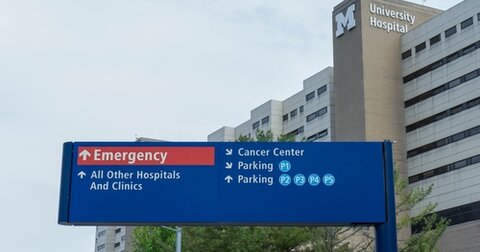Michigan University Hospital, union feud over parking spots
Nurses wanted closer parking to avoid taking the bus, paying for a parking permit
A recent legal dispute over parking spaces between the Michigan Nurses Association and a University of Michigan hospital is only the latest in a series of unusual conflicts in Michigan created by special demands from organized labor.
Labor unions typically bargain on behalf of employees over paid time off, worker pay and workplace conditions. But unions and employers also fight over unconventional issues such as the price of vending machine food and how many criminal offenses a teacher may have and stay on the job.
Nurses prevailed last month in a struggle over parking lot protocols. The University of Michigan altered employee parking arrangements to create more spaces for patients. The Michigan Nurses Association in 2019 demanded that the university make more parking spaces available for nurses and requested to bargain over the issue.
The hospital refused, and the union filed a complaint with the Michigan Employment Relations Commission. The commission ruled in favor of the nurses, and on Dec. 9, 2024, the Michigan Court of Appeals concurred.
The parking space case is one of many disputes that have arisen over bargaining issues whose connection to workers’ rights and wages is not immediately clear.
In 1979, the UAW filed a complaint with the National Labor Relations Board after Ford Motor Co. announced an increase in vending machine prices. The union requested to bargain over prices, and the company refused.
The federal board sided with the union. Ford disputed that decision in court. After the company exhausted its appeals, the U.S. Supreme Court agreed to hear the case. The high court ruled in favor of the National Labor Relations Board, and Ford was forced to bargain with the union over vending machine prices.
“It isn’t clear to me why the union doesn’t just go for the highest wages and benefits possible,” said Christopher Douglas, associate professor of economics at the University of Michigan-Flint and member of the Mackinac Center Board of Scholars.
Expensive vending machine food could offset some of a pay increase, Douglas noted. But wage gains apply to all workers, while a discount on vending machine food effectively means those who eat vending machine food get subsidized by those who do not. A similar dynamic applies to bargaining over parking spaces. If people who work at the hospital walk or take public transportation, they get no benefit from discounted parking.
Another unique bargaining tactic played out in a school about 100 miles north of Ann Arbor.
The Bay City Public Schools contract allows school employees who sell drugs the opportunity to keep his or her job thanks to a union provision in the district’s collective bargaining agreement.
The contract calls for disciplinary actions for people who are “involved in the unlawful sale, manufacture, or distribution or dispensation of tobacco, alcohol, or illegal drugs.”
The first offense is referred to as “activity.” If a union employee engages in an activity that state law classifies as a misdemeanor, the first offense will result in a three-day suspension and mandatory counseling. The Bay City contract expires in 2025. Michigan Capitol Confidential reported on the issue April 2024.
“These terms show just how out of hand collective bargaining in Michigan has become,” said Steve Delie, labor policy director at Mackinac Center Legal Foundation.
Instead of focusing on improving educational outcomes for Michigan’s children, Delie said, unions have negotiated for collective bargaining provisions that are irrelevant. He added the state Legislature should take a close look at these terms and consider whether they are the types of subjects that schools should be forced to negotiate.
Michigan Capitol Confidential is the news source produced by the Mackinac Center for Public Policy. Michigan Capitol Confidential reports with a free-market news perspective.


 Caregivers protest union effort to skim home helpers’ pay
Caregivers protest union effort to skim home helpers’ pay
 Ascension Genesys Hospital nurse charges Teamsters with additional abuses
Ascension Genesys Hospital nurse charges Teamsters with additional abuses

 Wealth creators stung by Michigan minimum wage ruling
Wealth creators stung by Michigan minimum wage ruling
 Business group, lawmaker disagree over impact of minimum wage hike
Business group, lawmaker disagree over impact of minimum wage hike
 Michigan Senate OKs paid sick leave compromise
Michigan Senate OKs paid sick leave compromise